|
|
|
Sort Order |
|
|
|
Items / Page
|
|
|
|
|
|
|
| Srl | Item |
| 1 |
ID:
174212
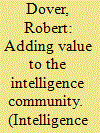

|
|
|
|
|
| Summary/Abstract |
Reviews of intelligence failures have recommended greater use of external expertise in challenging intelligence community assessments. External contributions were expected to augment covert collection and to provide open-source challenge to analysts, rather than to directly contribute to decision support. The structural limitations of the scope and machinery of intelligence have limited the value agencies can extract from external experts. Creating an Open-Source Intelligence Agency of commensurate size to primary intelligence organisations would enable decision support to be provided to all government departments. It would widen the pool of sources and experts, providing for greater extraction of value from experts who are only partially included in this government activity.
|
|
|
|
|
|
|
|
|
|
|
|
|
|
|
|
| 2 |
ID:
104147
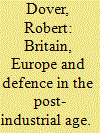

|
|
|
| 3 |
ID:
175056
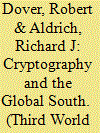

|
|
|
|
|
| Summary/Abstract |
For decades, espionage during the Cold War was often presented as a competition between East and West. The extent to which the Global South constituted the main battleground for this conflict is now being appreciated, together with the way coups and covert regime change represented a continuation of colonialism by other means. Recent revelations about the nature of technical surveillance and signals intelligence during this period paint an even more alarming picture. New research materials released in Germany show the ways in which Washington, London and even Moscow conspired to systematically attack the secure communications of the Global South. For almost half a century, less advanced countries were persuaded to invest significant sums in encryption machines that were adapted to perform poorly. This was a deceptive system of non-secrecy that opened the sensitive communications of the Global South to an elite group of nations, that included former colonial rulers, and emergent neo-imperial powers. Moreover, the nature of this technical espionage, which involved commercial communications providers, is an early and instructive example of digital global information inequality.
|
|
|
|
|
|
|
|
|
|
|
|
|
|
|
|
| 4 |
ID:
074224


|
|
|
|
|
| Publication |
2005.
|
| Summary/Abstract |
Using the empirically driven case study of the European Union's response to the Bosnian civil war 1992–95 this article assesses the effectiveness of the Common Foreign and Security Policy (CFSP), through Christopher Hill's ‘capabilities–expectations gap framework’. In assessing effectiveness it explores both the expectations placed on the EU and the capabilities the Union was able to deploy. Moreover, this research suggests that the EU was ineffective in responding to the Bosnian crisis. The EU pursued a rigid strategy of diplomatic and economic foreign policy, failing to generate the political will to attempt alternative approaches. This research argues that the capabilities–expectations gap framework is a useful tool for conceptualising the EU's effectiveness but that it under-specifies the importance of the end result of the policy.
|
|
|
|
|
|
|
|
|
|
|
|
|
|
|
|
| 5 |
ID:
148683


|
|
|
|
|
| Summary/Abstract |
Aggressive tax planning by multinational enterprises (MNEs) costs EU member states between €50-70 billion and €150-190 billion per annum through base erosion and profit shifting (BEPS). This tax gap has been blamed on ‘unethical’ companies acting legally, but inappropriately. Action to curtail this behaviour has been made possible by the confluence of two powerful movements: a popular articulation of tax morality as it relates to MNEs and the high issue salience reached as a consequence of the financial crisis and austerity in Europe, an emerging discourse around tax morality, and the efforts of prominent whistleblowers. As a result, domestic governments have removed their ‘soft’ veto and facilitated supranational bodies in innovating on corporate taxation, helping to rebalance the technical and structural superiority of MNEs in the international tax system.
|
|
|
|
|
|
|
|
|
|
|
|
|
|
|
|
| 6 |
ID:
153058


|
|
|
|
|
| Summary/Abstract |
The British Military Covenant can be located in and from many sources and from 2011 onwards in primary legislation. This article argues that the provision of military housing amounts to an early test of how the military covenant is understood and used by those involved in defence policy, and those in the armed forces affected by it. It finds that housing was a prominent feature of how service personnel understood how they were valued, but was not explicitly understood as a covenant issue by those personnel or the officials in charge of the Defence Estates. We locate three reasons for this: (1) the covenant has been poorly translated from aspiration into policy practice, (2) the covenant is unevenly understood across its stakeholders which has the effect of generating disappointment through misaligned expectations, (3) those engaged in the reform process surrounding the Defence Infrastructure Organisation (DIO) saw the covenant as a means to energise reform. Ultimately housing was seen as a dry and technocratic business area and thus an issue ripe for being refracted through the covenant was ultimately left outside of its remit.
|
|
|
|
|
|
|
|
|
|
|
|
|
|
|
|
| 7 |
ID:
131600
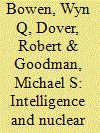

|
|
|
|
|
| Publication |
2014.
|
| Summary/Abstract |
Intelligence has long played an integral role in the context of western and broader international responses to the proliferation of nuclear weapons and efforts to contain the associated technology, materials and expertise. There are, of course, many challenges associated with accurately assessing proliferation intentions, processes, programmes and the underlying scientific and technical wherewithal. There is also an uneven record in this respect.
|
|
|
|
|
|
|
|
|
|
|
|
|
|
|
|
| 8 |
ID:
090015


|
|
|
|
|
| Publication |
2008.
|
| Summary/Abstract |
THIS ARTICLE is inspired by the current impasse over Georgia and South Ossetia, but it does explore broader issues. Georgia is merely the geographical location where the wider tension between major international actors is being played out. It might appear that I am denying Georgia its own agency in this crisis. This is an unintended consequence of my approach. I think it is quite plain that Georgia either fell into a trap devised by Moscow, or acted with gross stupidity to precipitate a Russian response.
|
|
|
|
|
|
|
|
|
|
|
|
|
|
|
|
| 9 |
ID:
108603
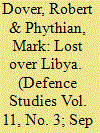

|
|
|
| 10 |
ID:
111667
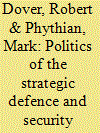

|
|
|
|
|
| Publication |
2012.
|
| Summary/Abstract |
This article examines the politics of the October 2010 Strategic Defence and Security Review (SDSR), focussing on the points of difference between the main political parties (and within the Cameron coalition government) and the political dynamics of the review process. In examining how the government's core mission to reduce the country's 'historic deficit' impacted on the review process and outcomes, we are also able to highlight the practical results of a political philosophy that is currently being implemented across Whitehall. We argue that defence is a path-finding policy area for a new kind of post-industrial bureaucratic environment typified by a 'thin-client' and 'smart customer' function that interacts with industry.
|
|
|
|
|
|
|
|
|
|
|
|
|
|
|
|
| 11 |
ID:
171231
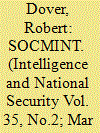

|
|
|
|
|
| Summary/Abstract |
The ubiquity of social media platforms promises greater government insight for horizon scanning, warning notice, investigations and situational awareness. This paper concludes that SOCMINT has utility in horizon scanning, offers limited value to warning notice and situational awareness. For the Five Eyes nations the adversary utilisation of SOCMINT is considerable and outweigh the advantages of this technology. Western powers are currently losing the information component of hybrid conflict. Consequently, capable and hostile cyber powers understand the western centre of gravity and have been able to undermine confidence in the public’s certainty in facts and democratic institutions.
|
|
|
|
|
|
|
|
|
|
|
|
|
|
|
|
| 12 |
ID:
163355
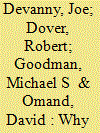

|
|
|
|
|
| Summary/Abstract |
In this article, Joe Devanny, Robert Dover, Michael S Goodman and David Omand explore the current problems facing intelligence analysis and analysts in the UK and consider what might be done to tackle them. They argue that nothing less than a revolution in the British government’s approach to intelligence assessment is required and that this ought to take the form of a School of Intelligence Assessment within a properly financed and structured National Security Academy.
|
|
|
|
|
|
|
|
|
|
|
|
|
|
|
|
| 13 |
ID:
132398
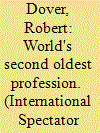

|
|
|
|
|
| Publication |
2014.
|
| Summary/Abstract |
The revelations from the former National Security Agency contractor, Edward Snowden, in July 2013 will have an enduring impact on the modern business of intelligence and the communication strategies of governments and non-state based adversaries alike. Snowden's revelations do not mark a fundamental divergence from the general understanding of intelligence. In making these implied understandings public, however, Snowden has changed the political dynamic around mass surveillance. The revelations amplify a tension within several layers of social contract from interactions between governments to those between governments and citizens. Long-term, diplomatic relations between the US and European governments should remain largely unaffected.
|
|
|
|
|
|
|
|
|
|
|
|
|
|
|
|
|
|
|
|
|